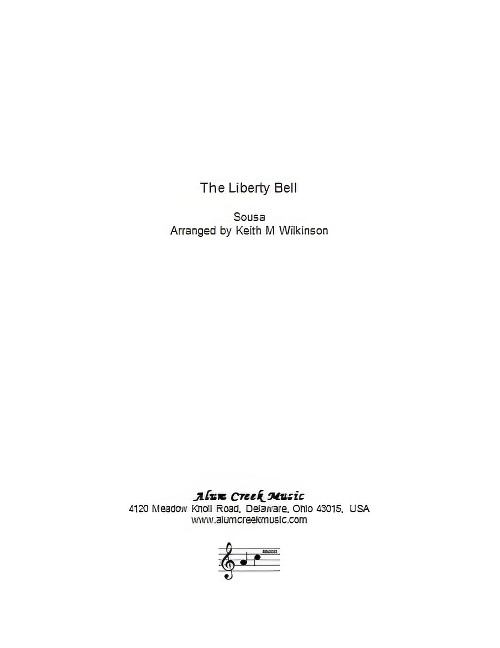Results
-
 £44.00
£44.00The Liberty Bell (Brass Band - Score and Parts) - Sousa, John Philip - Wilkinson, Keith M.
This march, written in 1893, was originally destined for inclusion in an operetta but after the composer had witnessed a spectacle called "America" in Chicago, which had as its backdrop a huge painting of the Liberty Bell, it was given the name by which it has become famous. Further recognition has come in more recent years by the adoption of the march as the signature tune for the popular TV programme, Monty Python.The arrangement includes several solos for a large unpitched bell which add aural (and visual) interest. It has been recorded by Brass Band of the Western Reserve, musical director Keith M Wilkinson, on the CD Slides Rule.
Estimated dispatch 7-14 working days
-
£29.95
The Maple Leaf (Brass Band - Score and Parts) - Coles, Bramwell
This march is characteristic in style of many written by Bramwell Coles. It derives its title from the song, 'The Maple Leaf Forever' while there are also strong references to 'O Canada' and 'Rule Britannia'.
Estimated dispatch 7-14 working days
-
£14.95
The Maple Leaf (Brass Band - Score only) - Coles, Bramwell
This march is characteristic in style of many written by Bramwell Coles. It derives its title from the song, 'The Maple Leaf Forever' while there are also strong references to 'O Canada' and 'Rule Britannia'.
Estimated dispatch 7-14 working days
-
£29.95
The Red Shield (Brass Band - Score and Parts) - Goffin, Henry
Written in 1928, this march has become a Salvation Army classic. The title refers to The Salvation Army red shield logo known the world over.
Estimated dispatch 7-14 working days
-
£14.95
The Red Shield (Brass Band - Score only) - Goffin, Henry
Written in 1928, this march has become a Salvation Army classic. The title refers to The Salvation Army red shield logo known the world over.
Estimated dispatch 7-14 working days
-
£29.95
The Redcliffe March (Brass Band - Score and Parts) - Hollis, Daniel
First published in 1929, this march was written when the composer was living in Redcliffe, Australia.
Estimated dispatch 7-14 working days
-
£14.95
The Redcliffe March (Brass Band - Score only) - Hollis, Daniel
First published in 1929, this march was written when the composer was living in Redcliffe, Australia.
Estimated dispatch 7-14 working days
-
£34.95
Time And Eternity (Cornet and Euphonium Duet with Brass Band - Score and Parts) - Bosanko, Ivor
Following the popularity of the composer's earlier cornet and euphonium duet, 'I'll Not Turn Back', this duet was written for The International Staff Band's 2000 recording, 'Renaissance' on which the soloists were David Daws and Derick Kane.
Estimated dispatch 7-14 working days
-
£17.50
Time And Eternity (Cornet And Euphonium Duet with Brass Band - Score only) - Bosanko, Ivor
Following the popularity of the composer's earlier cornet and euphonium duet, 'I'll Not Turn Back', this duet was written for The International Staff Band's 2000 recording, 'Renaissance' on which the soloists were David Daws and Derick Kane.
Estimated dispatch 7-14 working days
-
£29.95
To Win The World (Cornet And Trombone Double Trio with Brass Band - Score and Parts) - Bulla, Stephen
This double trio (three cornets and three trombones) was written for the National Capital Band of The Salvation Army in memory of Colonel William Maltby and is based on his own chorus, 'Keep on marching with a fighting faith'. Each solo part is of equal importance so six competent soloists will be required in order to make the piece sparkle!
Estimated dispatch 7-14 working days
